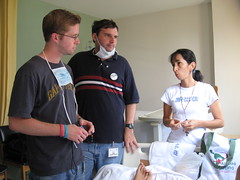 Getting all the foundations to upload their pictures to Flickr, and place the appropriate tags, descriptions, and titles, is difficult, because, for many of them, they're stepping into totally new territory, trying to navigate the internet, social networking sites, and slow connections, but I'm more convinced than ever that we're on the right track.
Getting all the foundations to upload their pictures to Flickr, and place the appropriate tags, descriptions, and titles, is difficult, because, for many of them, they're stepping into totally new territory, trying to navigate the internet, social networking sites, and slow connections, but I'm more convinced than ever that we're on the right track.  This past week, Kevin Hanson and Michael Burch, two volunteers who are currently in Colombia helping me with this project and volunteering with various other NGOs, spent a couple days last week in Bucaramanga, visiting the Living Hope Foundation. They were astounded by how committed the people from the foundation were, and Kevin, a soon to be law student, was able to learn a great deal about the way organizations can go about advocating for the rights of kids with cancer.
This past week, Kevin Hanson and Michael Burch, two volunteers who are currently in Colombia helping me with this project and volunteering with various other NGOs, spent a couple days last week in Bucaramanga, visiting the Living Hope Foundation. They were astounded by how committed the people from the foundation were, and Kevin, a soon to be law student, was able to learn a great deal about the way organizations can go about advocating for the rights of kids with cancer.I'm realizing, as I attempt to coerce the ten foundations into actually uploading all the pictures they take, that it will take a lot of training to make them familiar with everything that flickr will enable them to do. Learning to share digital stories and images with an online community is like learning to speak a different language, and, in order for them to invest time into this endeavor, there must be an incentive. It's difficult to explain to my seemingly technology-savvy friends the concept of creative commons copyrighting and citizen journalism, so, quite predictably, it is also difficult to explain the concept to hungry children who have been displaced by the violence. Still, it's not as difficult as one might imagine, because, as soon as they start to get the idea, they get so excited, because the camera offers them the first chance they've ever had to show their reality to the outside world.
During the next month, I'm going to begin a new, open-source, digital photography-based, educational, online grant proposal project. I know... it sounds a little out there, and I haven't quite figured out what to call it, but the basic idea is that foundations will apply for small, 500-1000 dollar grants by using digital images and descriptions within photo albums on Flickr. Having a applied for countless grants, I know the process is boring and often a total waste of time. When you apply for a grant, and don't get it, you feel like the entire process was wasted energy. No one reads the grant except the committee, or person, that makes the decision, and you often never get a good explanation for why a grant was approved or denied. You hope you have a contact with the donor and you cross your fingers. Why aren't grant proposals open to the public? Why can't we all see all the proposals that all these different organizations make? Why can't they be educational and interesting? The process should be educational for both the people and organizations that apply for the grants, as well as for the public in general. So, my goal is to use small grants as ways of teaching foundations to use the new internet technology that will help them get the word out about their cause. They will have to describe their foundations' mission and the proposed use of funds with photographs and descriptions open to the public on Flickr. Thus, even if they don't get a certain grant, they will have created an online multimedia space that describes a certain social, political, or economic issue, and they will have learned how to use a new type of web based software more effectively. After all, we've all had plenty of practice with microsoft word!